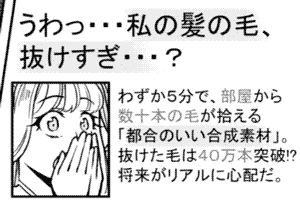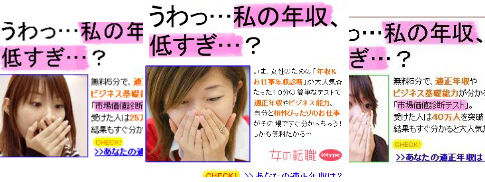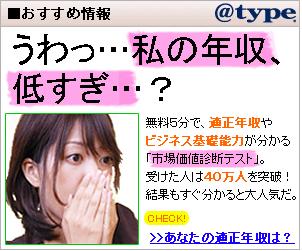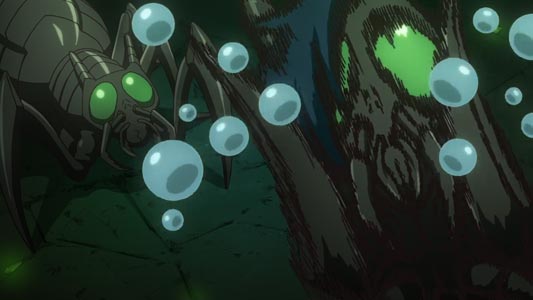In Japanese, uwa'... watashi no nenshuu, hiku-sugi...? うわっ・・・私の年収、低すぎ・・・?, meaning something like "yikes... my salary, it's too low...?" is a text used in an internet ad by a job-search company called @type, which featured a woman covering her mouth in shock, presumably after realizing how little she made. The ad copy became a meme, with parodies found even in manga and anime.
Origin
The origin of the meme is an ad by @type which featured the same uwa'... heading followed by variations of the ad body, and varied images of women covering their mouths in shock.
meta property="og:image" entry)I'm not sure when exactly it was published, but there were articles written about it in 2011(yukawanet.net:うわっ私の年収・・・に出てくる女性は誰なのか), so the ad, and the meme, is around a decade old by now.
As you may notice above, there are multiple versions of the ad, with different text. The version the memes tend to be based on most of the time in this one:
- Top-right corner: @type, the company who wrote the ad. On the left, osusume jouhou おすすめ情報 means "recommended information."
- uwa'... watashi no nenshuu φ, hiku-sugi...?
うわっ・・・私の年収、低すぎ・・・?
Yikes... my yearly income, is too low...?- uwa' - interjection, a sort of sigh used when dumbfounded at a situation or a person: uwa'... how can this person be like this... or uwa'... how did this end up happening...? I have no idea how to translate this to English, so I'll just leave it as "yikes."
- watashi 私 - one of the many Japanese first person pronouns.
- With no の it forms the possessive no-adjective "my."
- nenshuu
年収
The "income," shuunyuu 収入, one gets in a "single year of time," ichi-nen-kan 一年間.
The yearly income. The yearly salary.
Since this sounds a bit unnatural in English, you may also find it translated as "my salary is too low" without the "yearly" part. - In the pause represented by a comma is a null particle (φ).
- hikui
低い
Low. (as in not high.) - X-sugiru
〇〇すぎる
Exceedingly X. Too much X. Too X.
- {muryou go-fun de, tekisei nenshuu ya bijinesu kiso nouryoku ga wakaru} "shijou kachi shindan tesuto".
無料5分で、適正年収やビジネス基礎能力が分かる「市場価値診断テスト」。
The "market value diagnosis test" [with which] {in five minutes for free, [you] will know [your] suitable yearly income and base business ability}.- 「」 - quotation marks.
- muryou
無料
Without charge. For free.- yuuryou
有料
With charge. Paid.
- yuuryou
- The ya や parallel marking particle used here instead of the to と particle means the test lets you know the marked "suitable yearly income," "base business ability," and other things not mentioned as well.
- kiso nouryoku
基礎能力
Base ability. Fundamental abilities. - This sentence includes a relative clause whose topicalization is dewa では:
- wakaru - a cognitive stative verb used in double subject constructions. Exceptionally translates to future tense, "will know," because it's a conditional future situation: if you use this test, you'll know, if you used this test, you would know, with this test "you know" becomes true in the future.
- {uketa} hito wa yon-juu-man-nin wo toppa!
受けた人は40万人を突破!
The [number of] people [that] {received [the test]} [has] passed 400 thousand!- ichi-man
1万
Ten thousand. (times 40 = 400 thousand.) - hito 人 - person, ~nin ~人 - counter for people.
- toppa suru
突破する
To break through. To pierce through. To pass through a barrier. To exceed a threshold.
- ichi-man
- {kekka mo sugu wakaru} to dai-ninki da.
結果もすぐ分かると大人気だ。
[Because] {[you] know the results immediately}, [it] is very popular. - CHECK!
- anata no tekisei nenshuu wa?
あなたの適正年収は?
Your suitable yearly income [is]?
Examples
For reference, some examples of the phrase.
- Context: Ryuuguuin Seiya 竜宮院聖哉 tells Ristarte リスタルテ, who is a goddess, that he has been collecting the hair he finds in her room to use an ingredient for his synthesis skill, which combines two items together, because goddess hair is a valuable (?) item, so it improves whatever item it's synthesized with.
- Hearing this, given the amount of items Seiya had crafted using her hair, Ristarte worries she'll go bald.
- uwa'... watashi no kami no ke, nuke-sugi...?
うわっ・・・私の髪の毛、抜けすぎ・・・?
Yikes... my hair hairs, are falling out too much...?- kami - hair of the head, ke - fur, hairs individually, kami no ke - hairs of one's head hair.
- nukeru
抜ける
To come out. To fall out. To escape. To stop being contained.
- wazuka go-fun de, {heya kara suu-jippon no ke ga hiroeru} "{tsugou no ii} gousei sozai".
わずか5分で、部屋から数十本の毛が拾える「都合のいい合成素材」。
A "{convenient} synthesis material" [that] {in just five minutes, [one] can collect [dozens] of hairs [of] from [her] room}.- The "convenient synthesis material" is "goddess head hair," because you "can collect hairs" of it, ke ga hiroeru, from her room.
- suu~
数~
A number of. Multiple. Various. - ~hon
~本
Long, cylindrical objects. - suu-jippon
数十本
Multiple tens of [hairs].
[Dozens] of [hairs]. - {tsugou ga ii}
都合がいい
Its {convenience is good}.
It {is convenient}.
- tsugou no ii - has the no の subject marker instead.
- {nuketa} ke wa yon-juu-man-bon toppa!?
抜けた毛は40万本突破!?
The {fallen} hair has exceeded 400 thousands!? - shourai ga {riaru ni} shinpai da.
将来がリアルに心配だ。
[I]'m {seriously} worried about [my] future.- riaru
リアル
Real. (as opposed to virtual, fictional, or, in this case, in a sense like "things just got real," it's not a thing you can take lightly like a joke.)
- riaru
Anime: Meikyuu Black Company, 迷宮ブラックカンパニー (Episode 2)
- Context: Ninomiya asks an ant how much the ant earns for its hard work. The answer is nothing.
- shinjirarenai!!! omae no nenshuu φ hiku-sugi!!!
信じられない!!!お前の年収低すぎ!!!
[I] can't believe [it]!!! Your salary is too low!!!
Vocaloid Songs
Believe it or not, there's not one, but (at least) two Vocaloid songs based on this meme.
Meme Format
On Pixiv, illustrations using this meme format are tagged nenshuu hiku-sugi 年収低すぎ.(dic.pixiv.net:年収低すぎ)
For reference, some examples:
- Character: Zero ゼロ, from Megaman Zero, Rockman Zero, ロックマンゼロ.
- uwa'... watashi no rizaruto, hiku-sugi...?
うわっ・・・私のリザルト、低すぎ・・・?
Yikes... my results, are too low...?- rizaruto - the term for the score (S, A, B, C, D) in the game Megaman Zero.
- {muryou go-fun de, tekisei rizaruto ya akushon kiso nouryoku ga wakaru} "rokuzero shindan tesuto".
無料5分で、適正リザルトやアクション基礎能力が分かる「ロクゼロ診断テスト」。
The "rockzero diagnosis test" [with which] {in five minutes for free, [you] will know [your] suitable results and base action abilities}.- rokuzero - an abbreviation of rokkuman zero.
- akushon - action as in "action" game.
- {uketa} hito as hyaku-ni-juu-hachi-man-nin wo toppa!
受けた人は128万人を突破!
The [number of] people [that] {received [it]} [has] passed 1 million 280 thousand!- 128 is 27. As a single byte consists of 8 bits, the exclusive upper bound of a byte-length unsigned integer is 256=28, with 11111111 in binary being equal to 255 in the decimal number system. 128 is the exclusive upper bound of a signed integer instead, as one bit represents the sign of the number, i.e. whether it's a positive or negative number, e.g.:(stackoverflow.com)
- 1000000 = -128.
- 01111111 = +127.
- 1000000 + 01111111 = 11111111.
-128 + +127 = -1. - By the way, it may feel this doesn't make sense since 11111111 (128 unsigned) is higher than 01111111 (127 unsigned), but with signed it's -1 instead, so the bits of the byte don't actually represent a binary number, and teleport to negative (-128) when it hits 128 (10000000). Presumably, it's designed this way because from 0 to 127 both signed and unsigned representations refer to the same number, e.g. 00001111 is always 63. If signed started with 00000000 as -128 instead, that wouldn't be the case, as 00001111 would be -65 signed, but 63 unsigned.
- 128 is 27. As a single byte consists of 8 bits, the exclusive upper bound of a byte-length unsigned integer is 256=28, with 11111111 in binary being equal to 255 in the decimal number system. 128 is the exclusive upper bound of a signed integer instead, as one bit represents the sign of the number, i.e. whether it's a positive or negative number, e.g.:(stackoverflow.com)
- Because you know the results immediately, it's very popular.
- anata no tekisei rizaruto wa?
あなたの適正リザルトは?
Your suitable results [are]?
- Character: Pinkamena Diane Pie (Pinkie Pie), from My Little Pony: Friendship is Magic.
- Corner: MLP is the abbreviation of the series' title.
- uwa'... watashi no niji-sousaku, kowa-sugi...?
うわっ・・・私の二次創作、怖すぎ・・・?
Yikes... my [fan art], is too scary...?- niji-sousaku - "derivative works," fan fiction, fan art, fanzines (doujinshi 同人誌).
- kowai
怖い
Scary.
Something you're afraid of. Something you fear. - According to the illustrator: she uses atashi アタシ as first person pronoun, but watashi 私 was used for the text to fit. The "scary fan art" refers to works like Cupcakes (on youtube.com), which starts with a graphic violence and gore (guro グロ) warning, that you should really heed because holy shit what the actual fuck is this, and probably could use a flashing lights warning for viewers with epilepsy disorders, too, and whose top comment is "I watched this when I was younger and I hated pinkie pie after this and when I got a toy of her from McDonald's I thought it'd kill me so I locked it in my drawer."
- {muryou go-fun de, tekisei niji-sousaku ya ponii kiso nouryoku ga wakaru} "ponii kachi shindan tesuto".
無料5分で、適正二次創作やポニー基礎能力が分かる「ポニー価値診断テスト」。
The "pony value diagnosis test" [with which] {in five minutes for free, [you] will know [your] suitable fan art and base pony abilities}. - {uketa} ponii wa yon-man-tou wo toppa!
受けたポニーは4万頭を突破!
The [number of] ponies [that] {received [it]} [has] passed 40 thousand!- ~tou - counter for large animals, like cows, horses, ponies. It's written with the kanji for "head," atama 頭, so it's like counting "heads" of cattle.
- Because you know the results immediately, it's very popular.
- anata no tekisei niji-sousaku wa?
あなたの適正二次創作は?
Your suitable derivative works [are]?
- Character: Akaza Akari 赤座あかり from Yuru Yuri ゆるゆり. It's a joke in the series that she's supposed to be the main character but doesn't get a lot of screen time and ends up forgotten in the background a lot.
- Corner: yuruyuri is the title of her series.
- uwa'... Akari no deban, sukuna-sugi....?
うわっ・・・あかりの出番、少なすぎ・・・・?
Yikes... Akari's [screen time], is too [short]....?- deban - leaving the backstage to enter the screen, or getting the opportunity to participate an activity, like joining in a fight. Although this translates to "screen time," here it actually refers to the frequency one appears on the screen, not the length of time they are screen, which is why the adjective is sukunai, "few," not mijikai 短い, "short."
- The number of times she entered the screen is too few.
- Akari uses her own name as first person pronoun.
- {muryou go-fun de, toumei-dosuu ya shujinkou kiso nouryoku ga wakaru} "sonzaikan shindan tesuto".
無料5分で、透明度数や主人公基礎能力がわかる「存在感診断テスト」。
The "presence diagnosis test" [with which] {in five minutes for free, [you] will know [your] invisibility index and base protagonist ability}.- dosuu - numerical or quantified degree, value, index.
- sonzaikan - feeling of existence, whether you can feel something exists, that it is there, or not. Something with a strong sonzaikan has a lot of presence, while little sonzaikan means you don't even notice they're there.
- The number of people that received the test has passed 400 thousand!
Because you know the results immediately, it's very popular.
Your suitable yearly income is?
- Character: Ika-musume イカ娘, literally "squid girl," from Shinryaku! Ika-musume 侵略!イカ娘, "Invasion! Squid-girl," who comes from the ocean to invade the land where humans live.
- As part of her character, her blue hair is actually squid tentacles, and she often says geso at the end of sentences (gobi 語尾), presumably because geso 下足 refers to "squid tentacles."
- geso'... watashi no shinryaku-do, hiku-sugi...?
ゲソッ・・・私の侵略度、低すぎ・・・?
Geso, my degree of invasion, is too low...? - {muryou go-fun de tekisei shinryaku-do ya ika-nouryoku ga wakaru} "ika-musume tesuto".
無料5分で適正侵略度やイカ能力がわかる「イカ娘テスト」。
The "squid girl test" [with which] {in five minutes for free, [you] will know [your] suitable degree of invasion and squid ability}. - The number of people that received the test has passed 400 thousand!
Because you know the results immediately, it's very popular. - anata no tai-Chidzuru sentou nouryoku wa?
あなたの対千鶴戦闘能力は?
Your anti-Chizuru combat ability [is]?
- Aizawa Chizuru 相沢千鶴 is a character in the series whom Ika-musume is afraid of.
- dzu and zu are different ways to romanize づ, which in standard dialect sounds identical to zu ず. See yotsugana 四つ仮名 for details.
- Aizawa Chizuru 相沢千鶴 is a character in the series whom Ika-musume is afraid of.
- Character: Kyuubey, キュゥべえ, from Mahou Shoujo Madoka★Magica, 魔法少女まどか★マギカ, who offers girls contracts that they can accept to have their wishes granted, and, in exchange, they become magical girls.
- Corner: majika (マジカ) is a play on magika マギカ from the title.
- uwa'... boku to keiyaku shinai toka...!
うわっ・・・僕と契約しないとか・・・!
Yikes... [you] won't make a contract with me [and stuff like that]...!- keiyaku - contract, keiyaku suru - to do a contract, to enter a contract, to make a contract.
- toka - means you won't do a contract, and you have done other things that disappointed him as well.
- Kyuubei uses boku 僕 as first person pronoun.
- {{mahou shoujo no kosupre wo shite} {gomi wo katadzukeru} dake no} "kantan na oshigoto".
魔法少女のコスプレをしてゴミを片付けるだけの「簡単なお仕事」。
The "simple job" [in which] {[you] just {cosplay as a magical girl and} {clean up trash}}; - The number of people that received the test has passed 400 thousand!
- {{anime no} you da} to dai-ninki da.
アニメのようだと大人気だ。
[Because] {[it] is like {[it] is an anime}}, [it] is very popular.- It's like you're in an anime!
- anata no negai-goto wa?
あなたの願い事は?
Your wish [is]?- negau
願う
To wish. To request. To ask for something. - koto
事
Thing. - negai-goto - the thing you wish, what you wish, what you ask for.
- negau
Covering Mouth Pose
On Japanese anime Twitter, the phrase is sometimes used on random screencaps featuring characters covering their mouths.
うわ…私の年収、低すぎ…? #dea5 #rec_jikkyo pic.twitter.com/Qrg9rS5wxb
— Exv Tp.7 (@Exvt7) July 13, 2021
うわっ…私の年収、低すぎ…? pic.twitter.com/HZ3C26ltFk
— ラブライブ!クソゼリフグランプリ♡ (@lovelivekuso) July 14, 2021
私の年収……低すぎ? #ぼく勉 #bokuben #bs11 pic.twitter.com/tnBzrSjGTh
— 夏アニメ録画予約🍩 (@E_philia) October 12, 2019
うわっ、私の年収低すぎ…? #rezero pic.twitter.com/6XFLD1LnyI
— やんぴー (@yasunotweet) January 6, 2021
うわっ、私の年収低すぎ…? #dr_stone pic.twitter.com/7zL1hjHuyz
— やんぴー (@yasunotweet) July 19, 2019
私の年収 #astra_anime pic.twitter.com/HJfuFtZhZP
— 実況野郎ななーりん (@Nir7YE) July 3, 2019
Here's some others, for reference:
Anime: Sono Bisque Doll wa Koi wo Suru, その着せ替え人形は恋をする (Episode 1)
Anime: SPY×FAMILY (Episode 6)
References
- うわっ私の年収・・・に出てくる女性は誰なのか - yukawanet.com, accessed 2021-07-19.
- 年収低すぎ - dic.pixiv.net, accessed 2021-07-19.
- Why is the range of signed byte is from -128 to 127 (2's complement) and not from -127 to 127? - stackoverflow.com, accessed 2021-07-19.






Thank you for these posts on various Japanese stuff. Always excited when they show up in my RSS feed!
ReplyDelete